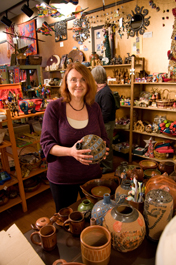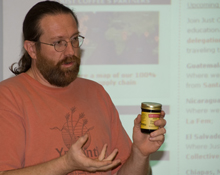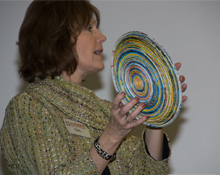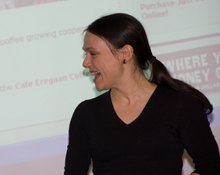Giving Rights to Trees: Fair Trade and Sustainability
- Paulette L. Stenzel
- Professor of International Business Law
- Department of Finance
- Eli Broad College of Business

Paulette Stenzel shops at Kirabo, a Fair Trade store in East Lansing, Michigan, owned by MSU alumna Gail Catron.
Paulette Stenzel is following the Fair Trade movement, especially as it develops in Latin America, with great interest. Along with other advocates for Fair Trade, Dr. Stenzel believes there is a direct connection between ethical business practices and sustainable development. "The link between environmental degradation and trade globalization has become increasingly clear," she said. "Developing countries invite new industries into their borders because their citizens desperately need jobs. In order to survive, they are forced to allow development that destroys natural resources."
Stenzel argues that businesses must take responsibility for environmental and socioeconomic outcomes that are directly related to their activities. "There is legal precedent for this view," she said. "As early as the 1950s, economists were urging businesses to accept responsibility for these effects. Today, many companies realize that sustainability efforts must be based on the triple bottom line of economy, social equity, and environment."
Stenzel serves as a monitor and analyst of Fair Trade progress in Central and South America. She travels extensively throughout the area and was in Ecuador during October of 2008, a few days after the country's new constitution was ratified by a large majority. "Ecuador is the first country in the world to give legal rights to nature," she said, "but many questions remain with respect to who will be able to bring legal action to enforce those rights and how courts will define them."
Stenzel's role is to report back to the international scholarly, legal, and business communities on how such policy changes play out in practice. Her research methodology is well suited to the cultural context within which she works. "Although the movement is large, individual advocacy groups are mostly small; linkages among activists are personal," she said. "One person leads to the next person who leads to the next one. It's all about relationships and trust. If you go there and don't speak the language, or only talk to corporate executives, you will miss important perspectives and information. You have to learn to listen, and not impose."
"Ecuador is the first country in the world to give legal rights to nature, but many questions remain with respect to who will be able to bring legal action to enforce those rights and how courts will define them."
Paulette L. Stenzel
Stenzel shares her observations in a variety of formats, from a personal Web site (tradeandsustainability.com) to the lecture circuit. Based on her reputation in the Fair Trade community, she has also been invited to serve as an editorial board member for an annual anthology, the Global Fair Trade Reader, of the Fair Trade Institute. It is a peer-reviewed publication, the first of its kind in the field.
The premier issue of the anthology, which is expected to appear during the fall of 2009, will include an article based on Stenzel's research in Nicaragua. In September 2007 she went to Nicaragua to learn from the managers and producers associated with Esperanza en Acción ("Hope Through Action"). Esperanza offers technical assistance to artisan groups throughout Nicaragua and helps connect producers to local and international markets.
Ms. Julia Holmer, an organizational developer for Esperanza who accompanied her on visits to artists affiliated with the organization, places a high value on her association with Stenzel. "Paulette Stenzel has added depth to my personal study and work with Fair Trade," she said.
"She understands that Fair Trade is not its own separate thing, outside of the mainstream economy. In fact, Fair Trade is trade. It is simply one way of carrying out business which takes into account all aspects of sustainability, especially that of the producers...I believe Dr. Stenzel understands this and her voice is important in academic and business circles."

David Finet

Gail Catron

Julie Cotton
David Finet of East Lansing Food Co-op, Gail Catron of Kirabo, and Julie Cotton of MSU's Sustainable Agriculture and Food Systems Specialization, served on a Fair Trade panel in Prof. Stenzel's business class.
What Is Fair Trade?
- Farmers receive a guaranteed minimum price with a premium for organic products.
- Workers have safe working conditions and living wages.
- Importers purchase directly from producers as often as possible.
- Farmers decide democratically how to invest their revenues.
- Fair Trade premiums are invested in social and business development projects.
- Farmers use environmentally sustainable methods.
Adapted from: TransFair USA. (2004). Fair Trade overview. Retrieved June 8, 2009, from: fairtradecertified.org.
- Written by Linda Chapel Jackson, University Outreach and Engagement